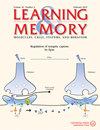内隔刺激提高大鼠空间工作记忆能力。
IF 2.2
4区 医学
Q4 NEUROSCIENCES
引用次数: 0
摘要
空间工作记忆(SWM)依赖于内侧隔区(MSA)的完整性及其在海马体中驱动θ (4-12 Hz)振荡的能力。本研究验证了光遗传θ刺激MSA可以提高大鼠海马依赖任务的选择准确性的假设。我们在延迟交替(DA)任务的延迟期(10秒或30秒)提供兴奋性或控制性θ刺激。我们发现,MSA刺激提高了30秒延迟试验的选择准确性,为MSA刺激提高SWM的概念提供了强有力的支持。本文章由计算机程序翻译,如有差异,请以英文原文为准。
Medial septal theta stimulation enhances spatial working memory performance in rats.
Spatial working memory (SWM) relies on the integrity of the medial septum area (MSA) and its ability to drive theta (4-12 Hz) oscillations in the hippocampus. This study tested the hypothesis that optogenetic theta stimulation of the MSA would enhance choice accuracy on a hippocampus-dependent task in rats. We delivered either excitatory or control theta stimulation during the delay period (10 or 30 sec) of a delayed alternation (DA) task. We show that MSA theta stimulation improved choice accuracy on the 30 sec delay trials, providing strong support for the notion that MSA theta stimulation boosts SWM.
求助全文
通过发布文献求助,成功后即可免费获取论文全文。
去求助
来源期刊

Learning & memory
医学-神经科学
CiteScore
3.60
自引率
5.00%
发文量
45
审稿时长
6-12 weeks
期刊介绍:
The neurobiology of learning and memory is entering a new interdisciplinary era. Advances in neuropsychology have identified regions of brain tissue that are critical for certain types of function. Electrophysiological techniques have revealed behavioral correlates of neuronal activity. Studies of synaptic plasticity suggest that some mechanisms of memory formation may resemble those of neural development. And molecular approaches have identified genes with patterns of expression that influence behavior. It is clear that future progress depends on interdisciplinary investigations. The current literature of learning and memory is large but fragmented. Until now, there has been no single journal devoted to this area of study and no dominant journal that demands attention by serious workers in the area, regardless of specialty. Learning & Memory provides a forum for these investigations in the form of research papers and review articles.
 求助内容:
求助内容: 应助结果提醒方式:
应助结果提醒方式:


